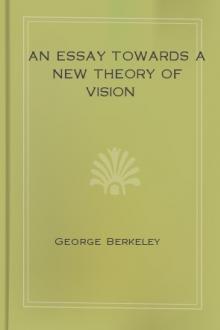author - "George Berkeley"

g any other IDEA. If I do not perceive theredness or paleness of a man's face themselves, it is impossible I shouldperceive by them the passions which are in his mind.
11. Now from sect. 2 it is plain that distance is in its own natureimperceptible, and yet it is perceived by sight. It remains, therefore,that it be brought into view by means of some other IDEA that is itselfimmediately perceived in the act of VISION.
12. But those LINES and ANGLES, by means whereof some MATHEMATICIANSpretend to explain the perception of distance, are themselves not at allperceived, nor are they in truth ever thought of by those unskilful inoptics. I appeal to anyone's experience whether upon sight of an OBJECT hecomputes its distance by the bigness of the ANGLE made by the meeting ofthe two OPTIC AXES? Or whether he ever thinks of the greater or lesserdivergency of the rays, which arrive from any point to his PUPIL? Everyoneis himself the best judge of what he perceives, and what not. in vainshall all the M

g any other IDEA. If I do not perceive theredness or paleness of a man's face themselves, it is impossible I shouldperceive by them the passions which are in his mind.
11. Now from sect. 2 it is plain that distance is in its own natureimperceptible, and yet it is perceived by sight. It remains, therefore,that it be brought into view by means of some other IDEA that is itselfimmediately perceived in the act of VISION.
12. But those LINES and ANGLES, by means whereof some MATHEMATICIANSpretend to explain the perception of distance, are themselves not at allperceived, nor are they in truth ever thought of by those unskilful inoptics. I appeal to anyone's experience whether upon sight of an OBJECT hecomputes its distance by the bigness of the ANGLE made by the meeting ofthe two OPTIC AXES? Or whether he ever thinks of the greater or lesserdivergency of the rays, which arrive from any point to his PUPIL? Everyoneis himself the best judge of what he perceives, and what not. in vainshall all the M